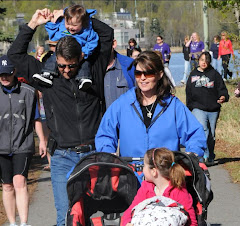 Many are still calling the idea that government bureaucracy would choose who lives and who dies ridiculous. I'll admit, it's a hard pill to swallow that Washington may choose not to plug in Grandma or could refuse treatment to those with disabilities. If you're still a doubter, check out this article:
Many are still calling the idea that government bureaucracy would choose who lives and who dies ridiculous. I'll admit, it's a hard pill to swallow that Washington may choose not to plug in Grandma or could refuse treatment to those with disabilities. If you're still a doubter, check out this article:Doctors left a premature baby to die because he was born two days too early, his devastated mother claimed yesterday. Sarah Capewell begged them to save her tiny son, who was born just 21 weeks and five days into her pregnancy - almost four months early.
They ignored her pleas and allegedly told her they were following national guidelines that babies born before 22 weeks should not be given medical treatment. Miss Capewell, 23, said doctors refused to even see her son Jayden, who lived for almost two hours without any medical support. She said he was breathing unaided, had a strong heartbeat and was even moving his arms and legs, but medics refused to admit him to a special care baby unit.
Miss Capewell is now fighting for a review of the medical guidelines. Medics allegedly told her that they would have tried to save the baby if he had been born two days later, at 22 weeks. In fact, the medical guidelines for Health Service hospitals state that babies should not be given intensive care if they are born at less than 23 weeks.
The guidance, drawn up by the Nuffield Council, is not compulsory but advises doctors that medical intervention for very premature children is not in the best interests of the baby, and is not 'standard practice'. James Paget Hospital in Norfolk refused to comment on the case but said it was not responsible for setting the guidelines relating to premature births.
A trust spokesman said: 'Like other acute hospitals, we follow national guidance from the British Association of Perinatal Medicine regarding premature births.' Miss Capewell, who has had five miscarriages, said the guidelines had robbed her son of a chance of life. She said: 'When he was born, he put out his arms and legs and pushed himself over.'
A midwife said he was breathing and had a strong heartbeat, and described him as a "little fighter".
I kept asking for the doctors but the midwife said, "They won't come and help, sweetie. Make the best of the time you have with him".' She cuddled her child and took precious photos of him, but he died in her arms less than two hours after his birth.
A midwife said he was breathing and had a strong heartbeat, and described him as a "little fighter".
I kept asking for the doctors but the midwife said, "They won't come and help, sweetie. Make the best of the time you have with him".' She cuddled her child and took precious photos of him, but he died in her arms less than two hours after his birth.
Miss Capewell, who has a five-year-old daughter Jodie, went into labour in October last year at 21 weeks and four days after suffering problems during her pregnancy. She said she was told that because she had not reached 22 weeks, she was not allowed injections to try to stop the labour, or a steroid injection to help to strengthen her baby's lungs. Instead, doctors told her to treat the labour as a miscarriage, not a birth, and to expect her baby to be born with serious deformities or even to be still-born.She told how she begged one paediatrician, 'You have got to help', only for the man to respond: 'No we don't.'
As her contractions continued, a chaplain arrived at her bedside to discuss bereavement and planning a funeral, she claims. She said: 'I was sitting there, reading this leaflet about planning a funeral and thinking, this is my baby, he isn't even born yet, let alone dead.'
As her contractions continued, a chaplain arrived at her bedside to discuss bereavement and planning a funeral, she claims. She said: 'I was sitting there, reading this leaflet about planning a funeral and thinking, this is my baby, he isn't even born yet, let alone dead.'
After his death she even had to argue with hospital officials for her right to receive birth and death certificates, which meant she could give her son a proper funeral. She was shocked to discover that another child, born in the U.S. at 21 weeks and six days into her mother's pregnancy, had survived.
Amillia Taylor was born in Florida in 2006 and celebrated her second birthday last October. She is the youngest premature baby to survive. Miss Capewell said: 'I could not believe that one little girl, Amillia Taylor, is perfectly healthy after being born in Florida in 2006 at 21 weeks and six days. 'Thousands of women have experienced this. The doctors say the babies won't survive but how do they know if they are not giving them a chance?'
Miss Capewell has won the support of Labour MP Tony Wright, who has backed her call for a review of the medical guidelines. He said: 'When a woman wants to give the best chance to her baby, they should surely be afforded that opportunity.' What the medical guidelines say...Guidance limiting care of the most premature babies provoked outrage when it was published three years ago.
Experts on medical ethics advised doctors not to resuscitate babies born before 23 weeks in the womb, stating that it was not in the child's 'best interests'. The guidelines said: 'If gestational age is certain and less than 23+0 (i.e at 22 weeks) it would be considered in the best interests of the baby, and standard practice, for resuscitation not to be carried out.'
Medical intervention would be given for a child born between 22 and 23 weeks only if the parents requested it and only after discussion about likely outcomes. The rules were endorsed by the British Association of Perinatal Medicine and are followed by NHS hospitals.
The association said they were not meant to be a 'set of instructions', but doctors regard them as the best available advice on the treatment of premature babies. More than 80,000 babies are born prematurely in Britain every year, and of those some 40,000 need to be treated in intensive care. The NHS spends an estimated £1 billion a year on their care.
But while survival rates for those born after 24 weeks in the womb have risen significantly, the rates for those born earlier have barely changed, despite advances in medicine and technology.
Medical experts say babies born before 23 weeks are simply too under-developed to survive, and that to use aggressive treatment methods would only prolong their suffering, or inflict pain.
The guidelines were drawn up by the Nuffield Council on Bioethics after a two-year inquiry which took evidence from doctors, nurses and religious leaders.
Medical experts say babies born before 23 weeks are simply too under-developed to survive, and that to use aggressive treatment methods would only prolong their suffering, or inflict pain.
The guidelines were drawn up by the Nuffield Council on Bioethics after a two-year inquiry which took evidence from doctors, nurses and religious leaders.
But weeks before they were published in 2006, a child was born in the U.S. which proved a baby could survive at earlier than 22 weeks if it was given medical treatment. Amillia Taylor was born in Florida on October 24, 2006, after just 21 weeks and six days in the womb. She celebrated her second birthday last year. Doctors believed she was a week older and so gave her intensive care, but later admitted she would not have received treatment if they had known her true age. Her birth also coincided with the debate in Britain over whether the abortion limit should be reduced.
Some argued that if a baby could survive at 22 weeks then the time limit on abortions should be reduced. The argument, which was lost in Parliament, followed a cut to the time limit in 1990 when politicians reduced it from 28 weeks to 24 weeks, in line with scientific evidence that foetuses could survive outside the womb at a younger age.
Some argued that if a baby could survive at 22 weeks then the time limit on abortions should be reduced. The argument, which was lost in Parliament, followed a cut to the time limit in 1990 when politicians reduced it from 28 weeks to 24 weeks, in line with scientific evidence that foetuses could survive outside the womb at a younger age.
However, experts say cases like Amillia Taylor's are rare, and can raise false expectations about survival rates. Studies show that only 1 per cent of babies born before 23 weeks survive, and many suffer serious disabilities.
Do you have words? I don't.
 Rest in peace, Jayden Capewell. Your death will not be in vain.
Rest in peace, Jayden Capewell. Your death will not be in vain. 


















3 comments:
No words, only tears and a prayer.
Eternal rest, grant unto him, O Lord,
and let perpetual light shine upon him.
May the souls of the faithful departed through the mercy of God rest in peace. Amen
1. This is the very thing I do not understand about government run health care supporters. We read horror story after horror story from the UK and Canada yet they still think stuff like that won't happen here.
2. I am totally loving your blog! The title is pure perfection!
Thanks!
Post a Comment